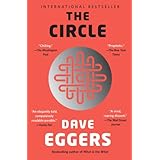I've had a love/hate relationship with Dave Eggers for a few years now. I thought "Zeitoun" was brilliant (http://bit.ly/1rpaSIy). On the other hand, I was completely underwhelmed with "Your Fathers, Where Are They..." and wasn't afraid to say so when I reviewed it for "Library Journal." For the past several weeks I've been completely immersed in "The Circle." If you find that I'm missing in action on Facebook and Twitter, this novel will be the reason why.
Since I've retired I find that I spend much less time in my car and really miss the chances to get involved in audiobooks. It takes me a lot longer to "read" them. I found myself just making up errands so that I could continue to listen to the silky, sexy voice of Dion Graham, one of my favorite audio performers, as he narrated this foreboding look at the power of large tech companies, think Google, Apple, or Microsoft, to infiltrate and eventually control our minds. I totally understand why some of my friends and family are completely off the grid.
We meet Mae Holland on her first day of work at The Circle, a giant California technology campus where the best and the brightest would kill to work. Mae has her best friend Annie, a mover and shaker on campus, to thank for putting in a good word. From the first chapter my stomach began to clench as the orientation committee began to separate Mae from all aspects of her former life, confiscating her laptop and phone, while downloading all of her information to the new, snazzy, company provided devices.
Then there's the creepy mandatory physical and the outwardly warm, sweet physician with the Nazi mentality who already seems to know everything about Mae from her tiniest childhood scrapes and bruises. Pressure is put on employees of The Circle to wear wristbands similar to fitbits, if you've seen those, which record vital statistics 24/7.
The description of a day at work for Mae, in a cubicle in front of multiple screens, wearing a headset that poses non-stop consumer questions in her ear, questions that she must answer with a smile or a frown, while also responding to in-coming emails from worldwide consumers and co-workers, is absolutely harrowing. Naturally, the more Mae excels, the more she is given to do. The Circle expects nothing less than 100% client satisfaction.
Kids fortunate enough to land jobs at The Circle are encouraged to give up their off campus apartments to live in studios within The Circle's borders. After all, participation in after-hours social activity is monitored and judged by the number of "zings" one sends and receives (think tweets). Visits to family are considered distractions.
What happens if a "circler" just needs to take a little break from all this togetherness? Hold your breath. Mae's spur of the moment kayak sojourn is caught on one of The Circle's new surveillance cameras (designed for our safety, of course) and her penance for that precious time alone is to become the spokesperson for The Circle's latest innovation, a wearable audio/video device that will enable complete transparency. Mae will now share all aspects of her life, except bathroom breaks, with the entire world.
"The Circle" is a cautionary tale for the 21st century and would make for an excellent book discussion. How much of our privacy are we willing to give up? How much are we entitled to know about our neighbors, friends, politicians? Where do mavericks like Julian Assange or Edward Snowden fit in? Villains or heroes? And how many faux friends do we need to claim on Facebook to make ourselves feel valued? Read this book, then decide.


No comments:
Post a Comment